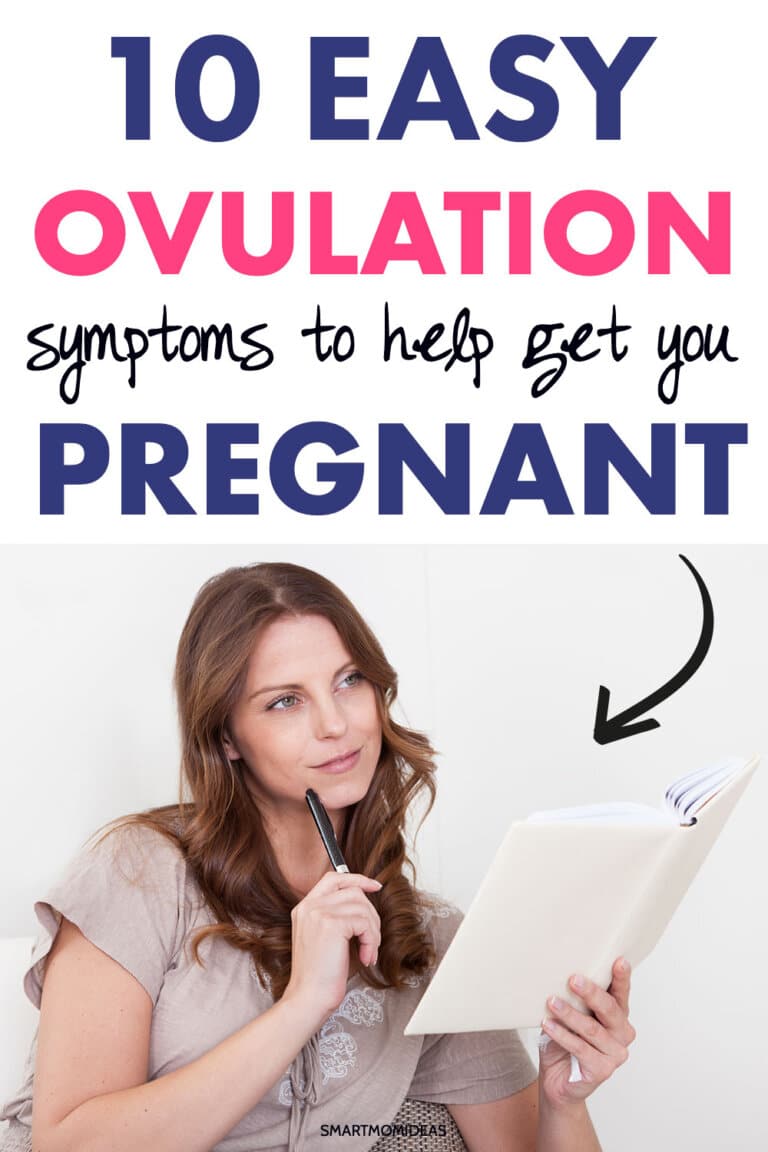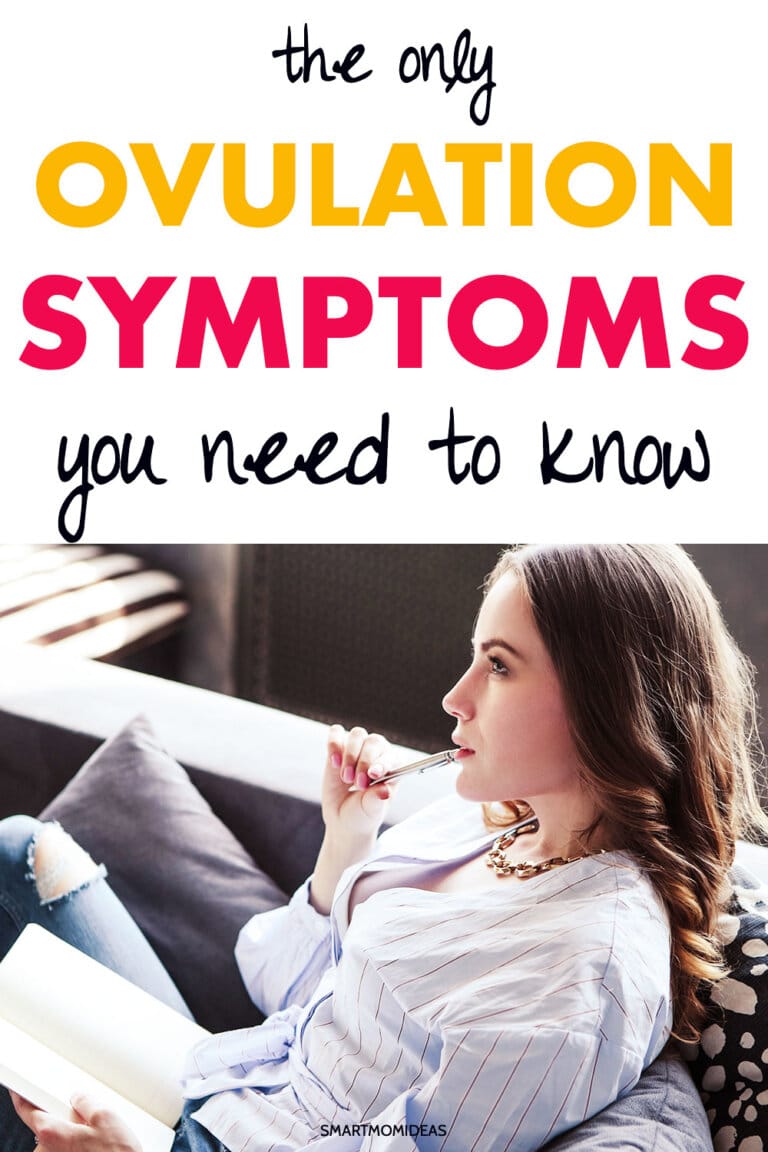Ovulation symptoms to pay attention to if you want to get pregnant fast

Are you trying to conceive and have no clue how to read your body?
Some of the best ways to get pregnant is to start tracking your ovulation symptoms.
Because if you don’t already know, to increase your chances of getting pregnant, you should be engaging in intercourse when you are at your peak ovulation days.
While there is no exact science to predict with 100% certainty that you will be ovulating, there are many things that you can do to increase your chances of conception.
During your total menstrual cycle, there are about seven days in which your fertility window is open.
However, there are only one to two days of peak ovulation where it is the ideal time to try and get pregnant.
Your body is very smart and will show signs and symptoms of when you are ovulating.
This should signal to you that it’s time to get busy in the bedroom!
But before we get into the specific ways that your body tells you that you are ovulating, let’s take a quick look at how you can also track your ovulation cycle.
How to Track Ovulation
Every women’s cycle is different. There are also many different factors that contribute to the length of your cycle as well as your ability to conceive.
Here are just a few:
- Genetics
- Diet
- Lifestyle choices (smoking, drinking, ect…)
- Weight
- Body fat percentage
- Medical issues (such as PCOS or cervical cancer)
When it comes to tracking your cycle, you have a few options.
Other than using an old fashioned pen and paper to write down when you have your period, there are 2 other ways to track ovulation.
Use can use a testing kit to test just like you would a pregnancy test. Or you can use a tracking app on your smartphone.
The testing kit will help to give you some accuracy as to your peak fertilization days. Use it just like a pregnancy test to determine if you are experiencing low, high, or peak fertility.
The best testing kit is one that has ovulation strips and pregnancy strips like this from from East@Home.
Tracking apps allow you to track when you are experiencing period and ovulation symptoms. This will then help you to estimate your high and peak ovulation days and the app will provide information on that.
Once you have figured out a few ways that you can track your ovulation cycle, it’s time to start listening to your body.
For the best possible results to your trying to conceive efforts, track these symptoms below.
Ovulation Systems to Pay Attention To

As women, our bodies are amazing!
There are so many subtle symptoms and signs that your body gives you that you are ovulating that you might not even realize. These signs are different for every woman. While some women might not even experience symptoms, others might experience symptoms similar to the start of a period, which can be confusing.
1. Changes in Cervical Fluid
After puberty, pretty much every woman will experience some type of cervical fluid throughout the month. Otherwise known as vaginal discharge. This can be a good indicator of not only your vaginal health but also where you are in your cycle.
During ovulation, the cervix will secrete a clear, mucus type discharge, almost similar to egg whites. You are experiencing peak ovulation when you have the highest amount of discharge.
You shouldn’t ever be embarrassed by this discharge, every woman experiences it at some point. If you feeling uncomfortable, then find a comfortable panty liner to help absorb any moisture or potential smell.
2. Changes in Basal Body Temperature
If you are unfamiliar with what basal body temperature means, it is the temperature of your body when fully at rest. By accurately tracking your basal body temperature, you can determine when there is a decrease or increase in it.
You can easily track your basal body temperature first thing in the morning before you get out of bed. Use a digital thermometer to take your temperature. If possible, try to do it at the same time every morning before you get up and start moving around.
As your body is preparing to ovulate, your basal body temperature will slightly decrease. After ovulation, your basal body temperature will experience a sharp increase. This is a sign that ovulation has ended.
When you have tracked your basal body temperature for a few months, you should then be able to predict your ovulation with accuracy.
3. Changes in Cervical Position or Firmness
While this one might be more difficult to tell, your cervix will change in position and firmness depending on whether or not you are ovulating.
When ovulation occurs, the cervix becomes more open and softer. It will also become higher in position and moister.
You or your partner can try and regularly check the firmness of your cervix by inserting two fingers up to the knuckle and assessing your cervix.
4. Breast Tenderness
If you have been pregnant before, you are aware of how sensitive your breasts can get due to hormonal changes.
This can also happen in preparation for ovulation. While many women can associate having tender breasts with the onset of menstruation, it actually begins when ovulation starts.
This is another reason why using a tracking app can be very helpful. Not only can you track when you are having your period, but also other symptoms like breast tenderness or increased sex drive.
5. Fluid Retention
While many women think that feeling bloated during the month is a sign of your menstrual cycle, it is actually a common symptom of ovulation.
Bloating is again due to the hormonal changes that the body experiences during ovulation.
The body tends to retain more water when estrogen levels are higher. Changes in hormonal levels can also have an effect on the digestive tracts, which can also contribute to feeling bloated.
During the days of bloating, you might also experience cravings to certain foods, such as anything salty. Eating foods higher in sodium can also contribute to fluid retention and bloat.
If you want to decrease symptoms of bloating, keep a close eye on what you are eating. Avoid eating anything that might make you feel worse.
6. Increased Sex Drive

Before we had fancy tracking apps and doctors knew all about how women’s bodies worked, there was nature. You might find that during certain times of the month that you seem a little more in the mood than others.
This is due to the increased hormone levels your body puts out right before ovulation takes place.
Nature wants you to get pregnant, therefore your hormones ramp up and your sexual desire increases right before and during ovulation.
7. Spotting
Ovulation occurs when your ovary releases an egg in preparation for pregnancy. This is not to be confused with menstrual bleeding, which is when the lining of the uterus is shed.
Many women can experience light spotting during ovulation.
Blood that is light pink is often mixed with cervical fluid, which is an indication of ovulation. Spotting during ovulation takes place outside of a regular period and is significantly lighter in color and flow than a normal period.
Spotting during ovulation only lasts about one to two days.
8. Ovulation Pain
Mittelschmerz is a fancy German word for “middle pain,” or a pain that occurs during ovulation. The pain can be mild or more severe and lasts for a very short period of time or a couple of hours.
Depending on which ovary the egg is released from, that is the side of the abdomen that will experience pain. Generally, many women will experience vaginal discharge or spotting during this time. Some might also experience nausea depending on the severity of the pain.
You can generally tell that the pain you are experiencing is middle pain due to ovulation when it happens about two weeks after your regular period.
I occasionally get ovulation pain on one side of my abdomen and it does give me discomfort, but only briefly.
9. Mood and Appetite Changes
As women, our hormones fluctuate a lot during the month. These changes in hormones can have a drastic effect on appetite and certain eating behaviors. Generally speaking, women seek to have more energy during the time of ovulation.
This can lead to an increase in appetite and craving higher fat and carbohydrate-rich foods.
Eating these kinds of foods also helps to raise serotonin levels and boost that feel-good hormone.
This can help to combat feelings of depression after ovulation has ended. During this time women tend to self-medicate with this like chocolate, ice cream, and half of a pizza.
While this might feel like a temporary fix, binging on fatty, salty, and sweet foods isn’t going to benefit you in the long run.
10. Heightened Sense of Smell
This is just one more way that biology lets you know that your body is ready to start making babies! Back in the day before any kind of genetic testing or dating sites were available, women would seek out more masculine men to mate with.
This was an indicator of him being able to produce healthy children.
When women ovulate, they are much more sensitive to smells. In particular, they are more sensitive to male pheromones. Biologically, this was used to sniff out potential mates.
Now, this heightened sense of smell can help to get you in the mood during your most fertile time of the month.
In addition to tracking your cycle, you should also track the other symptoms mentioned here.
Knowing when you are ovulating and being able to listen to your body will help to increase your chances of conception.
Over to You
Trying to conceive can sometimes be frustrating and difficult. It was for me.
Know that there are ways to help speed up your chances of getting pregnant by these ovulation symptoms.
Share with me in the comments which symptoms helped you with pregnancy!
Remember to pin me!





Leave a Reply